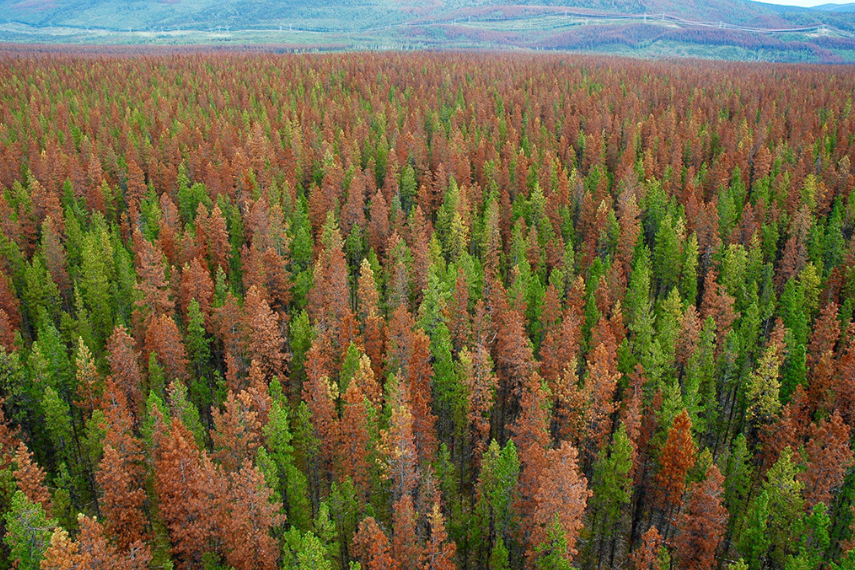Beetles Ignite Wildfire Fears

Flames and Beetles: A Forest Saga
The intersection of climate change, invasive species and natural disasters has become a serious topic for climate change experts. Among these concerns, the impact of mountain pine beetle outbreaks on wildfire occurrences in British Columbia represents a significant environmental and ecological challenge. This insect kills trees by boring into their bark and interrupting nutrient flow. Over time, the trees die, becoming dry and brittle, increasing the available fuel load on the forest floor. The invasive mountain pine beetle has devastated lodgepole pine forests across North America, affecting millions of hectares and altering the landscape's susceptibility to wildfires.
One of the primary challenges in understanding the relationship between mountain pine beetle outbreaks and wildfires is the complex interplay of environmental factors that contribute to fire risk and behaviour. Indeed, there are still uncertainties about the impact of the beetle on wildfire spread. Additionally, the extensive damage caused by these beetles over vast areas complicates the prediction and management of wildfires. Distinguishing the effects of mountain pine beetle infestations from other contributing factors, such as climate change and human activities, adds another layer of complexity to addressing this issue.
Cracking Fire Codes: The Mountain Pine Beetle’s Role
Drs. Khurram Nadeem, Christopher Bone and their research team in the University of Guelph’s Department of Mathematics and Statistics have developed a model based on lasso-logistic regression, a statistical method to both predict outcomes and select important predictors in a dataset. This model aimed to forecast the likelihood of wildfires in the regions affected by mountain pine beetles, distinguishing between human-caused and lightning-caused fires. The model simultaneously fits the data and selects relevant variables, including those related to beetle outbreaks. The use of resampling techniques further enhanced the model's capability to handle imbalanced datasets, improving its predictive accuracy and reliability.
The research yielded valuable findings, notably that mountain pine beetle-affected areas exhibit a higher propensity for large, lightning-caused fires. While human-caused fires did not show a discernable increase in beetle-affected regions, lightning-caused fires in these areas were found to be twice as likely to exceed 100 hectares compared to unaffected areas. This significant discovery not only confirms the heightened fire risk associated with outbreaks but also clarifies previously mixed literature on the subject.
Time to Take Actions
The findings of the research are concrete evidence to inform fire management strategies and policy decisions, such as the need for targeted fire surveillance and preparedness measures in regions suffering from beetle damage. Moving forward, the project aims to refine fire prediction models by integrating the impact of mountain pine beetle outbreaks. Addressing the gap in current models regarding beetle effects will aid in developing more accurate fire management strategies. Additionally, future research will seek to disentangle the confounding effects of climate change and beetle outbreaks on wildfire incidence, providing clearer insights into their respective roles.
"Our research clarifies the muddy waters of previous literature by providing concrete evidence of the interaction between mountain pine beetle outbreaks and the incidence of large fires," says Nadeem, "This not only highlights the increased fire risk associated with these outbreaks but also underscores the importance of integrating these insights into policy and forest management decisions. It is crucial for management strategies to consider the enhanced risk of large fires in beetle-affected areas, particularly as these regions bear the scars of invasive species' impact on our natural landscapes."
Funding: The research was supported by the fRI Research Grant and the University of Guelph's Food from Thought program. The fRI grant funded Dr. Hyeyoung Woo’s postdoctoral research fellow position under the supervision of Drs. Christopher Bone (Victoria University), Khurram Nadeem (University of Guelph) and Steve Taylor (Natural Resources Canada). These funding sources also played an appreciable role in facilitating the study, accessing data and enabling the team to employ advanced statistical methods and data analysis techniques.
Reference: H. Woo, C. Bone, K. Nadeem, and S. W. Taylor, “Influence of mountain pine beetle outbreaks on large fires in British Columbia,” Ecosphere, vol. 15, no. 1, p. e4722, 2024, doi: 10.1002/ecs2.4722.

Mathematics & Statistics

Geography